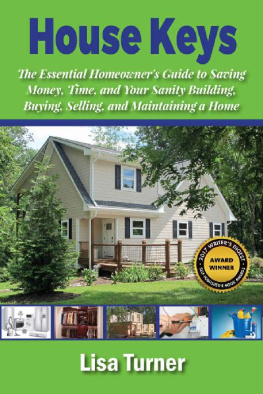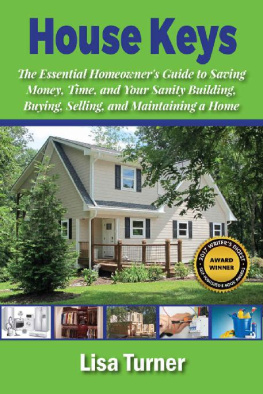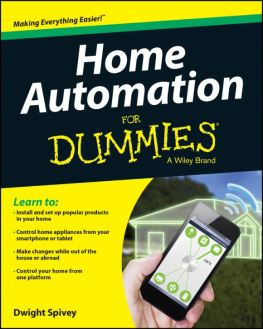House Keys
House Keys
The Essential Homeowners Guide to Saving Money, Time, and Your Sanity Building, Buying, Selling, and Maintaining a Home
Lisa Turner
Lisa Turner
Copyright 2017 Lisa Turner
All rights reserved
No part of this publication may be reproduced, distributed, or transmitted without the express consent of the author
ISBN-13: 9781546350316
ISBN-10: 1546350314
Library of Congress Control Number: 2017907020
CreateSpace Independent Publishing Platform
North Charleston, South Carolina
DISCLAIMER: This book is designed to provide information and motivation to my readers. It is sold with the understanding that I am not trying to render psychological, legal, or any other kind of professional advice. The content of each article is the sole expression and opinion of its author. No warranties or guarantees are expressed or implied by the procedures outlined in this book. Neither the publisher nor the individual author shall be liable for any physical, psychological, emotional, financial, or commercial damages, including, but not limited to, special, incidental, consequential or other damages. Our views and rights are the same: you are responsible for your own choices, actions, and results. If you do not feel comfortable doing any of the things in this book, please hire a qualified professional to do them for you.
Dedication
To Jerry
Acknowledgements
T hanks to The Clay County Progress newspaper staff and Becky Long, Editor, for cheerleading my home improvement columns and providing the encouragement to assemble this book. Thanks to my husband, Jerry, for inspiration and advice, and to Pat Nardy, home inspector and mentor, for her patient coaching. Last and best: thank you Clay County Progress readers. Your flow of ideas and appreciation keep me charged.
Preface
T he articles in this book were written from 2010 to 2017 for the readers of the Clay County Progress . They reflect the mountain and lake ecology of Hayesville, North Carolina, a picturesque town rich in history, populated with wonderful and thoughtful people.
Writing about homes and property brings me great enjoyment. When inspecting, I love using checklists and solving problems. Every time I see a problem, I think of a way a homeowner could prevent it. As I write, I hope to inspire you to not only head off potential catastrophes, but also make you smile. Ive tried to weave information and fun together so that you will remember the advice.
Time is short; happiness is precious. These tips and tricks aim to increase your happiness and satisfaction with your time at home, which should not be filled with endless chores. Using the checklists and techniques will bring added value to your home and help you untangle the stress mess.
Your enjoyment of this book will be my reward in writing it.

Table of Contents

All About Home Inspections
Getting the Most Out of Your Home Inspection
Y ouve located the home of your dreams. Your real estate agent has drawn up the offer and the offer has been accepted. Now you have a few weeks in which to perform your due diligence your research on the home. Is this home everything you think it is? When your agent asks you if you want to get a home inspection, your answer should be Yes. Following the six tips here will maximize your home inspection results.
Get the best inspector . A really good inspector will catch just about every problem that exists in a home, and be able to put the issues into perspective for you so that you can make a decision. Your inspector should be licensed and/or certified at what they do, and have a good experience level. Your agent will give you several names; either call each one, or research them on the internet. The best inspector and the worst inspector will likely charge you the same amount of money, so why not maximize your return?
Be there for the inspection. 85% of home buyers are not present during the inspection, thinking that they will disturb the work of the inspector. Not so. The inspector will welcome you for the inspection, and be glad that they can point out the most important issues to you so that you fully understand what he/she has found.
Ask the right questions. Your inspector is making value judgments as they inspect would they buy it? Ask your inspector to be honest with you take advantage of this special inspector-client privilege relationship to ask him/her what their concerns are. These are things they wont write in the report, but they will discuss with you.
Ask for a show and tell on any items you do not understand. If you are not at the home during the inspection, arrange for a call with your inspector after the inspection to discuss these items. The inspector will tell you things over the phone that may not be in the report.
Maintenance advice. Although not part of the formal inspection, most good inspectors will tell you what items in the home require regular maintenance and will tell you what that maintenance consists of. Take advantage of the inspectors expertise.
Ask for referrals . Who does the inspector recommend for repairs? This is also something you will not see in the formal report, but the inspector will have a few very talented tradespeople that they use and you should find out who these people are.
Follow these tips to get the most out of your due diligence. Buying a home is one of the largest investments you will make; dont put yourself in the position of finding serious problems after the sale and being trapped. This up-front effort will ensure you know exactly what you are getting.

How To Use a Home Inspection Report To Save Money
S hould you use a home inspection report to make a home buying decision? Definitely. Realize that I am biased in favor of this advice, because I was once a home inspector. The stuff I found on inspections was a constant source of surprise to me. All homes have defects. While most are minor, all it takes is one big one to blow the budget over to the next county.
I am also an airplane nut. This summer at an airshow, I held a talk about building your own airplane. Afterwards someone came up to me and said they were going to purchase a used homebuilt aircraft that very day. I asked them who they were having inspect the craft before the purchase. They said that they were skipping the inspection, saying, It flew in here to the show so it must be fine.
If youre buying a house, this is like saying the homes roof doesnt leak water so everything must be fine inside.
Whether you are buying an airplane or a home, get an inspection. The price you pay will pale in comparison to what you might end up spending to correct major defects. Heres how to use an inspection report to save you money.
Dont worry about the small stuff. A stuck window can be fixed. A leaky faucet can be repaired. Missing attic insulation can be added. You can even ask the seller to make repairs. They dont have to, but many times sellers will bend over backwards to make you happy. Skip over the small stuff in the report and go to the section called Major Items. These are at the top of the list in the report and/or in the summary.
The seller is supposed to tell you about significant defects. This rarely happens. This is not necessarily because the seller is covering it up, but because they dont know about it. I have gone into dozens of basements to find furnaces that were recalled because of carbon monoxide hazards and the owner had no idea (and was lucky).
Next page












